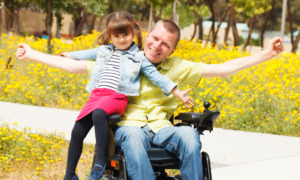An estimated 1.5 million young people have parents in prison. Many of these kids may be acting out because of feelings of loss and anger. Like living in foster care or having been sexually abused, having an incarcerated parent is one of the more significant but often unnoticed causes of the emotional problems that youth workers encounter.
Wish You Were Here
By Antwaun Garcia, 18
My father wasn’t born with a silver spoon in his mouth, so any way that would make him money, my father was about it. Maybe he could have gone and got a job and worked the typical nine-to-five. Some reason, that didn’t work for him, and if it did, he probably wouldn’t have been able to find work because of his police record.
Once I saw my father actually get arrested. I was about 6 or 7. My parents would always fight over something stupid. Somehow, this particular argument got physical and led to the streets. Someone called 5-0 and the next thing I knew the police were trying to calm my father down. But talking and trying to reason with my father just didn’t work.
As police clipped those silver bracelets on him, tears ran down my face. Didn’t I want to see my father leave, but what was I to do? I wanted to jump in and help free my father, but all I could do was stand there, not moving an inch. They put him head-first in the car and he sat there in back, mad as hell. My uncle came after me to make sure I didn’t do anything stupid, like chase after my father.
A little later, I moved with my sister to my aunt’s crib. Then it became hard. You never know how much you’ll miss someone ’til they aren’t there anymore. I guess that’s how I felt about my father.
I used to sit there in my room and reminisce about what my father and I used to do. When we were in Harlem, we used to sit in my older brother Chic’s room, and eat some of Grandma’s Spanish food while watching the Bulls game. Then there were those times when he would teach me how to do a fade-away shot like Jordan. Those were times you can never forget. No matter what bad things or situations you’ve been in, the good ones last forever.
All the cards and letters my father ever wrote me from prison, I kept. Whenever I missed him or thought about him, I reread the letters.
On my 11th birthday I was in the car going to an amusement park with my family and my aunt gave me a card from my father. There was a rose on the outside. Inside it said, “I’m sorry, Son, I couldn’t be there for your 11th birthday. I wish I could be there to see your face behind those candles, with your face smiling as you blow out those candles.”
After I finished reading the card, I pulled my head back and felt the tears fall.
Even though my father was going in and out of jail, I was never scared to tell people what he did. I wasn’t ashamed to say, “Yeah, he got locked up for beating someone up, or selling, or whatever.” Even though I knew my father was ashamed of his past, I wasn’t.
Later on, I felt that his being in jail and absent from my life wasn’t fair. He would write letters to me, and he would ask me to respond. But I never did. Didn’t I know what to say to him. I didn’t want to say I was fine, when I wasn’t.
Soon the letters stopped, and soon the thoughts of me and him stopped too. As I got older, it was like I didn’t care for him anymore. I thought, “Screw him. He isn’t here for me now, so I don’t need him in the future.”
My father wasn’t there to teach me about sex. He wasn’t there to teach me how to talk to females, or how to play ball. So I felt like I was my own man and I would do whatever I had to do.
When he finally came out of jail, he came to see my baby sister and me. It had been four years since we’d communicated.
When I first saw him get off the bus, I wanted to run and hug him like I used to as a child, but then my anger came over me and it told me to just chill and lay back and see if he actually recognized me. When he saw me he gave me a hug, but my arms paused a moment before hugging back. At first I felt a little happy to see him, then it was like, “Let’s just see how the day goes.”
As the day went on, my feelings changed. I was having fun with him. We chilled in the crib and just talked and laughed as we used to. The feeling at the end of the day wasn’t bad. When I had to say my good-byes, it was more like, “later,” meaning, “I will see you again.”
Since then I’ve started to realize that everyone messes up. While I can never forget what I went through with my father locked up, I am also trying to forgive him, so that I can have him in my life without being angry.
The pain ain’t healed – the pain of growing up without parents around, or the pain of always hearing something negative about them. Just so much pain.
But it also makes me stronger. Pain and guilt seem to be my only tool these days to stay alive, to strive for greatness, to write and to be the person I am.
45 Minutes on the Inside
By Mary Fory, 15
Visiting my father in prison is one of the most important moments for me. When I go to visit him, I feel happy and excited. It is a wonderful feeling that I can’t even explain.
When we go, we have to make a line outside the jail and wait until other people come out. Once we get inside, we have to make another line and wait to be called. Then my mother, who is the only person we can go with, has to give proof that she’s our mother and give our birth certificates, too.
We can’t wear a bra, we can’t wear anything that has metal, like chains, earrings, bracelets, overalls, rings. We can’t chew gum. We can’t take money inside. It was amazing all the things that we had to do just to see my father for 45 minutes.
After we are checked, we go to a big room where there are three big tables. Each table has 10 spaces with a number. They give us a number and we sit down and wait for my father. The inmates have to make a line and then they go to see their families, who are waiting for them anxiously.
My father comes and he sits behind the table. This is the best moment because I can hug him and kiss him, but it is sad sometimes, because the rules say that you can just kiss him and hug him one time. If you don’t follow the rules, they don’t let you continue with the visit.
It’s a great moment when I can see him and tell him everything about home and how much I love and miss him. He always says, “Oh, all of you look very pretty today,” and he asks if there are any problems at home.
He wants to know how we are behaving, if we are doing well in school, if we are helping our mother. He always asks these kinds of questions, and tells us stories about the place, and that’s the way we spend our 45 minutes.
The worst moment comes when I have to say good-bye to that person who I want to be with always. It’s funny when you see all the wives kissing their husbands in a desperate way, but it is also sad.
I feel very restricted when I have to see him just for 45 minutes, when I used to see him every day. It’s hard when I just want to take him home with me and when I feel helpless because there is nothing I can do to take him out of there.
When I go to visit him, he always shows a happy face. He has faith and he says he knows we’re OK. But I know my father and I know he’s not happy in that place. He says that sometimes he feels lonely and that he always thinks about us the whole day. He says that every day there is the same.
© 2002, Youth Communication/New York Center, www.youthcomm.org.






























